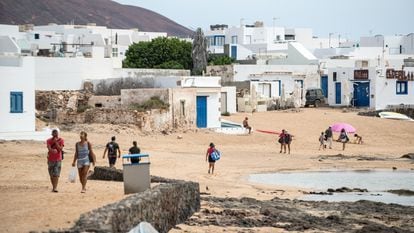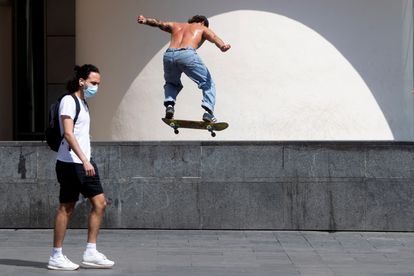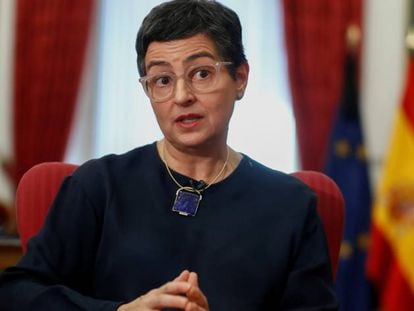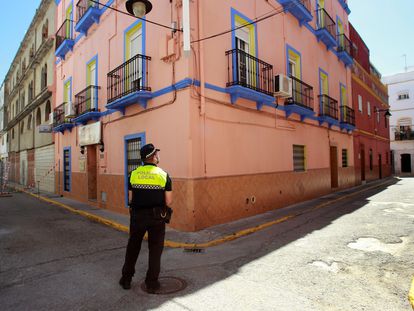Spain’s ‘new normality’ – the new rules region by region
The state of alarm came to an end in most of Spain today, but now each territory can set its own regulations. Here is a rundown of what they are choosing to do
/cloudfront-eu-central-1.images.arcpublishing.com/prisa/DDWYUEV4OZHGPLMEG7KB7TD634.JPG)

Most of Spain left behind more than three months under a state of alarm on Sunday, entering the so-called “new normality,” in which social distancing of 1.5 meters is still required, and masks must be worn when that is not possible. Galicia was the first region to leave behind the government’s coronavirus deescalation phases, entering the new normality on Monday, while the Basque Country, Cantabria and Catalonia made the change on Friday.
Limits on capacity in commercial premises are now in place in nearly all regions, and this will remain the case until either an effective treatment or vaccine for the coronavirus is found. If there are major outbreaks in Spain, a state of alarm may well be introduced once more.
The end of the state of alarm today also means that Spain’s regions recover all of their powers, and the new normality allows citizens to move freely throughout Spanish territory once more. Today also marks the reopening of the country’s borders to travelers from other European Union countries, including the United Kingdom, and those coming from the Schengen area. Below are the main regulations in each of Spain’s regions so far under the new normality.
Andalusia. Four hundred measures planned until spring
The southern Spanish region of Andalusia will introduce 400 measures today in a decree that will set out the new normality. The measures are likely to be in place until spring. Among them are limits of 75% capacity inside businesses, with 100% permitted on sidewalk cafés and restaurants. Capacity in swimming pools in hotels and tourist accommodation will be at 50%, with 65% for cinemas, museums, theaters and auditoriums, and 75% in private pools. Open-air concerts will have a maximum capacity of 1,500 people, while 60 people will be permitted at open-air funerals and 30 at indoor services, Javier Martín Arroyo reports.
Aragón. Local fiestas suspended until September
Recreational areas and bars and restaurants will see capacity rise to 75% in Aragón, excluding nighttime bars and nightclubs, which will be limited to half usual capacity and with tables and chairs on dancefloors. Children’s play parks will reopen today with hygiene measures obligatory, while local fiestas will be suspended until September 30.
Asturias. Time limits on beaches
The regional government will leave it up to local councils as to the maximum time that beachgoers can stay on the shore. Nightclubs and nighttime bars will be able to operate at 50% of capacity, but with no dancefloors. The hostelry sector can operate at 100% of usual capacity. Local fiestas have been divided into three categories, with those considered high risk suspended. Those that are medium risk are limited to 50 to 75% of capacity, and low-risk fiestas at 100%, but in all cases social distancing must be observed and masks are compulsory. Children’s play parks are reopening with the same conditions, and a supply of hand sanitizer gels is recommended for users. Capacity of common and recreational areas in shopping malls is limited to 50%.
Balearic Islands. Limits of 300 people
The regional government in the Balearics will not permit establishments with capacity for more than 300 people to reopen, and will limit the rest to 75%. On the beaches, each person must occupy four square meters of sand, and activities such as excursions and sports are limited to groups of 30 people.
Basque Country. Four square meters per person in sports areas
The Basque Country has reopened children’s play parks and open-air sports venues. In all cases, an area of four square meters per person must be guaranteed. Elevators and cable cars used to move around the city will reopen at 100% of capacity, but masks will be obligatory. Capacity for public events will increase, but with distinctions. Open-air cultural events can hold up to a thousand people, as can open-air sports events such as athletics and cycling. In closed spaces this figure falls to 300 people. Nightclubs and other nighttime venues will restart activity with 60% of capacity, but with tables on dancefloors separated by 1.5 meters, Pedro Gorospe reports.
Canary Islands. Four square meters of beach per person
The low levels of coronavirus on the Canary Islands mean that there will be no capacity limits in bars and restaurants, but stores will be limited to 75%. Groups of up to 30 people can carry out activities, 25 if indoor, and on the beaches each person will have a demarcated space of four square meters. Local fiestas are suspended for now.

Cantabria. Weddings with up to 150 guests
Cantabria entered the new normality on Friday with limits of 75% capacity in hostelry, retail and cultural events (in the latter case with a limit of 25 people). Hostels, tourist facilities and nightlife venues will be limited to 50%. Active and nature tourism activities are limited to 30 people. Weddings can have 150 guests, a number that is halved if the event takes place indoors. Places of worship will be limited to 75% of capacity, and masks will be obligatory. Open-air concerts and shows can have up to a thousand people if capacity is not exceeded by 75%, and attendees must be seated and respect social distancing. Sports events cannot exceed 300 people in closed spaces, with a thousand permitted outdoors. Showers and foot washes on beaches can only be used by one person at a time.
Castilla-La Mancha. Capacity limited to 75%
The regional government is limiting capacity to 75% in practically all establishments as a way of homogenizing and facilitating the application of one single measure in all situations. Local fiestas are not recommended before July 15, and senior and day centers can reopen provided they are not located next to residences where vulnerable collectives reside.
Castilla y León. Pools can reopen at 75%
The region is leaving behind the state of alarm and starting a summer without fiestas. Any event that generates crowds and where social distancing is not possible has been prohibited. Concerts and open-air activities are allowed if people can stay apart. Hostelry will see bars reopen with a limit of 75%, while nightclubs will have to put tables on the dancefloor and limit capacity to a third. Pools can open at 75%, while sports competitions without contact are permitted, with a thousand attendees outdoors, and 500 indoors. Limits will be applied to religious ceremonies and funerals, according to the size of the venue.
Catalonia. Individual responsibility
The regional government is relying on individual responsibility to avoid new coronavirus infections. Capacity limits – 50% for indoor premises, 70% for sidewalk cafés – will remain in place until June 25, but after that date there will be a “change of concept,” according to the regional health chief, Alba Vergés. “The percentage is not important, but rather that people identify a safe distance inside the venue,” she said. Social distancing of 1.5 meters must be observed at open-air events, but this can be reduced if masks are used.

Extremadura. New lockdowns in the case of outbreaks
The regional government has established two phases for the new normality, and has included new lockdowns in a decree it passed on Friday if there are fresh outbreaks of the coronavirus. In the first stage, which will last until July 31, capacity will be limited to 50% on a general basis, rising to 75% after that date.
Galicia. Almost a week in the new normality
Galicia moved to the new normality on Monday. Most places where the public frequent have increased their capacity to 75%, apart from terraces (80%) and common areas in shopping malls (50%). Children have been able to return to play parks after three months of closure, and there are no more limits on the number of people who can meet in private residences. Open-air events are limited to a thousand people, who must be seated, and 300 if they take place indoors, Sonia Vizoso reports.
La Rioja. Appointments for all events
The regional government has decided not to limit capacity in areas where social distancing can be observed. This will happen, however, at large events, which will operate at 75% with a maximum of a thousand attendees. Everyone will have to register before attending such an event in order to facilitate their identification in case of infections. Local fiestas can take place, but there can be no events with crowds where attendance cannot be regulated, such as fairs, large attractions or bullfights. Bullrings will see capacity limited to a thousand people. For spaces such as swimming pools, 75% capacity will be the general rule.
Madrid. A return to normality in two stages
The Madrid region is establishing two stages for the new normality. Between today and July 5, all businesses will have their interior capacity limited to 60%, rising to 80% for sidewalk cafés and restaurants. Patrons will also be able to drink and eat at the bar. From July 6, these percentages will be increased to 75% and 100%, respectively. The use of face masks will continue to be obligatory when 1.5-meter social distancing is not possible. These regulations will be applied to the majority of businesses, with some exceptions. Swimming pools will be limited to 50%, while nightclubs will remain shut until at least July 5, as will social services centers, apart from residences. The latter will see their visiting schedules relaxed, but prior appointments will continue to be obligatory. Children’s play parks will reopen, and summer camps will be permitted, with 300 attendees when outdoors, and 75 in closed spaces. Gyms will be limited to 20 users at a time, rising to 25 from July 6, and no material can be shared, Juan José Mateo reports.
Murcia. Hotels at full capacity
Hotels will be able to open all rooms in Murcia, but common areas will be limited to 75% capacity – the same percentage will apply to practically all businesses and recreational areas in the region. Outdoor weddings can have up to 500 guests, with 200 if indoors and up to 800 if there are specific plans. Funerals can count on 50 mourners, 30 if indoors. Summer camps can take up to 150 participants and there will be no official sports activities until at least September 15.
Navarre. A summer with no bulls
Fiestas are important, but not essential. That is the message from the Navarre regional government, after having canceled the most popular fiestas in the region – including the world-famous Sanfermines bull-running event in Pamplona. Hostelry will be limited to 75% capacity, and large events limited to a thousand people outdoors and 500 inside. Creches for children aged up to three will also restart activity, but with strict regulations.
Valencia region. University classes with less than 1.5 meters
The Valencia region will maintain the majority of Phase 3 measures in place, such as capacity limits of 75% in general and 60% for shopping malls. Face masks will be obligatory when 1.5-meter social distancing is not possible. Open-air events, such as festivals, will be limited to 800 people. Funerals will have a limit of 50 people when outdoors, and 25 when inside. The region has not announced measures for schools yet, but has stated that university students can return and must wear masks if they are closer than 1.5 meters to one another. Capacity in universities will be limited to one person per 2.5 square meters, Ignacio Zafra reports.
English version by Simon Hunter.












































